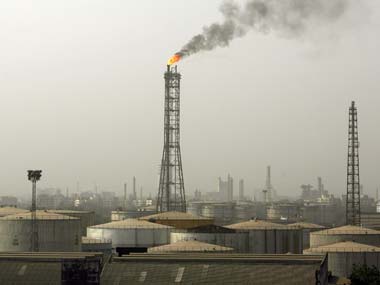New York: The US and Europe are trying to stop Iran, the world’s third-biggest oil exporter, from selling crude. Iran’s response is to threaten to disrupt shipments from the entire Middle East.
Yet oil prices have hardly budged. They’re at $98.95, up just 12 cents since the start of year.
Just a year ago, uprisings in far less important oil-producing countries such as Egypt and Libya sent oil and gasoline prices to their highest levels in three years and prompted Western nations to release millions of barrels of oil from emergency supplies.
The reason for such calm this year: No oil has been blocked, and there’s a good chance none will be.
The US and Europe want to deprive Iran of the oil income it needs to run its government and, most importantly, fund what the West believes is an effort to build a nuclear weapon. Last year, Iran generated $100 billion in revenue from oil, up from $20 billion a decade ago, according to IHS CERA, an energy consulting firm.
The European Union announced Monday it would ban the import of Iranian crude starting in July. The US already doesn’t buy Iranian oil, but last month it placed sanctions on Iran’s banks to make it harder for that nation to sell crude. The US, however, has delayed implementing those sanctions for at least six months because it is worried about sending oil prices higher at a time when the world economy is struggling.
[caption id=“attachment_192955” align=“alignleft” width=“380” caption=“The US and Europe are trying to stop Iran, the world’s third-biggest oil exporter, from selling crude. Iran’s response is to threaten to disrupt shipments from the entire Middle East.Reuters”]  [/caption]
Iran, in retaliation, has threatened to block the Strait of Hormuz, a narrow Persian Gulf waterway between Iran and Oman through which one-fifth of the world’s oil passes. If that were to happen, experts say oil prices could soar toward $200 per barrel and deliver a blow to already wobbly Western economies. Drivers would pay more for gasoline, airlines would spend more on fuel and shippers would pay more for diesel. That would leave people and companies with less money to spend and invest.
Using oil as a political weapon is an old tactic, but it may not be effective this time. If either side blocks the sale of oil in a meaningful way, it hurts itself. Iran’s economy depends on the sale of oil. The economies of Western nations depend on reasonably priced oil.
Here are key questions and answers about what the European ban on Iranian oil could mean for energy markets.
Q: What is Iran’s role in the world oil market?
A: Iran exports 2.5 million barrels of oil per day, about 3 percent of world supplies. About 500,000 barrels go to Europe and most of the rest goes to China, India, Japan and South Korea. These Asian customers do not plan to stop buying Iranian oil.
Iranian fields produce a type of oil known as heavy, sour crude. This is a common type of crude that contains more sulfur than so-called light, sweet crude. Heavy crudes are harder and more expensive to refine into valuable fuels such as gasoline and therefore generally command a lower price.
Q. With all the saber rattling, why aren’t oil prices soaring?
A: Because oil will likely keep flowing. Asian countries, already Iran’s biggest customers, aren’t joining the Europeans in banning Iranian crude. Also, the European embargo doesn’t start until July, so markets will likely have time to adjust.
As Europe turns away from Iran to other markets, though, it could push up prices for certain types of global crudes. And the brinkmanship between Iran and the West may already be having some effect on prices, analysts say. “It could already be baked into the price (of oil),” says, Michael Levi, Director of the Program on Energy Security and Climate Change at the Council on Foreign Relations
Q: Will the embargo hurt or help Iran?
If Iran can no longer sell to Europe, it will have to find other buyers. That won’t likely be difficult, especially given Asia’s rising demand for oil. But Asian nations may be able to negotiate a discount for Iranian oil. “In the oil market, a little discount goes a long way,” says Bhushan Bahree, a Middle East oil expert at IHS CERA.
On the other hand, if global oil prices rise and Iran can sell its oil for somewhat higher prices, Iran’s oil revenue will grow.
Q: If Iranian oil is prevented from getting to market, will other nations be able to make up the difference?
A: Eventually, yes. The US is pressuring other Middle East and African nations to increase production to help keep Europe and the world well-supplied as the embargo slowly takes effect. Saudi Arabia says it could increase its supplies to make up for any lost Iranian crude. Iran’s relatively heavy crude is easier to replace than the Libyan light, sweet crude that was cut off during last year’s uprising.
Still, an increase in production from other nations would leave little wiggle room for those countries to increase supplies further if needed. The oil market gets nervous, and sends prices higher, if it thinks producing nations don’t have capacity to pump more oil to make up for a supply interruption somewhere in the world.
AP


)
)
)
)
)
)
)
)
)



